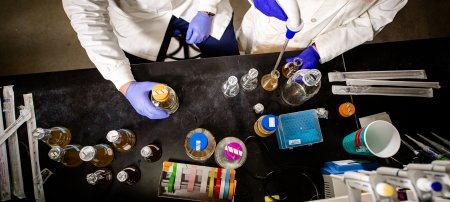Michigan Technological University was among a select group of universities invited by members of the U.S. House of Representatives to present at a joint hearing called “Pursuing the Golden Age of Innovation: Strategic Priorities in Biotechnology.”
Michigan Technological University was well represented on Capitol Hill earlier this month. On Thursday, June 5, the House Science, Space, and Technology Subcommittee and the Subcommittee on Energy invited four expert scientists, engineers and educators to provide testimony for the committee to better understand the strengths and threats to American biotechnological research and the biotech sector of the economy. These experts included Stephen Techtmann, associate professor of biology at Michigan Tech and associate director of the University's Great Lakes Research Center.
Techtmann provided testimony to the joint hearing about his lab's research, the research of other Michigan Tech labs and the importance of basic research to advance emerging biotechnology. The other three experts who testified were Drew Endy of Stanford University, Deb Gracio of Pacific Northwest National Laboratory and Kelvin Lee of the University of Delaware. The joint bipartisan hearing allowed congressional members to make statements and ask questions about innovations in biotechnology, a field poised to revolutionize industries including health care, agriculture and manufacturing.
The U.S. has historically been a global leader in biotechnology — leading in foundational research, commercializing over a thousand inventions and spawning dozens of startups — but America now faces unprecedented global competition. Some nations are deploying "all-of-nation" strategies, collaborating and coordinating national resources to dominate biotechnology, including potential military applications. The June 5 hearing focused on identifying key priorities for future investment needed for the U.S. to maintain its position as a global biotechnology leader.
The "Golden Age of Innovation" in biotechnology is a near-future reality fueled by the convergence of biology, computing and data science. At Michigan Tech, examples of this convergent work include research conducted by Techtmann and other researchers in the Great Lakes Research Center, who are pioneering solutions that transform plastic waste into valuable materials and recover critical minerals from mine waste materials.
I come from the great state of Michigan. For generations, we've succeeded by uniting innovation and production. We don't just invent new ideas, we bring them to life, we scale them for the world. Biotech is the next frontier of this story for Michigan. With the right investments, we know that biotech can unlock new industries, create high-wage jobs, support rural and agricultural communities, and even help us meet environmental goals. I'm so proud to welcome Dr. Steven Techtmann of Michigan Technological University, our newest R1 institution, whose work exemplifies how biotech can solve modern problems and uplift regions like northern Michigan and the Upper Peninsula.

A key driver of the biotechnology revolution is artificial intelligence, which offers the unprecedented ability to accelerate the processing and interpretation of large collections of data. Big data is ubiquitous in biological systems. The limitation is how quickly and deeply we can understand these systems. AI assists by helping scientists "program" cells with specific functions, much like computers are programmed today. Federal agencies like the National Science Foundation (NSF), the National Institute of Standards and Technology (NIST), and U.S. Department of Energy (DOE) National Laboratories are strategically positioned to lead these national efforts, fostering innovation and setting crucial standards in the evolving landscape of biotechnology.
At the hearing, Techtmann and his fellow experts delivered a unified message to Congress: America's biotechnology leadership hinges on immediate and sustained investments in both basic and applied research. Witnesses called for strategic investments across the innovation pipeline — from basic research at NSF, NIH and DOE National Laboratories to shared biotechnology infrastructure, workforce development and robust security protocols. Continued engagement, coordination and support from these federal agencies is essential to maintain America's edge.
"The university has a key role to play in advancing biotechnology in the bioeconomy. That role is both in training the future biotechnology workforce as well as research that provides fundamental knowledge that's applied to solving real-world problems. This mindset is core to the DNA of Michigan Tech. Michigan Tech is charged with advancing knowledge that's applicable."
The final portion of the hearing underscored the need for investment in shared biotechnology infrastructure to achieve both scientific excellence and financial efficiency. Experts highlighted that fundamental research, often in publicly funded institutions like the NSF, NIH and DOE National Laboratories, is essential for unlocking the mysteries of basic biological units like cells. Witnesses also stressed the urgent need to address vulnerabilities in the U.S. biotechnology supply chain, reduce dependence on foreign suppliers for critical materials and enhance biosecurity measures. The consensus was clear: Sustained investment in research, workforce development and robust security protocols are vital to securing America's competitive edge and ensuring the beneficial and safe advancement of biotechnology. As Techtmann's testimony demonstrated, Michigan Tech and other academic research institutions are ready to lead this biotechnology revolution in partnership with public and private stakeholders.
Michigan Technological University is an R1 public research university founded in 1885 in Houghton, and is home to nearly 7,500 students from more than 60 countries around the world. Consistently ranked among the best universities in the country for return on investment, Michigan's flagship technological university offers more than 185 undergraduate and graduate degree programs in science and technology, engineering, computing, forestry, business, health professions, humanities, mathematics, social sciences, and the arts. The rural campus is situated just miles from Lake Superior in Michigan's Upper Peninsula, offering year-round opportunities for outdoor adventure.






Comments